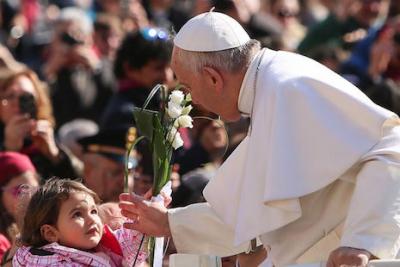Despite pandemic, Iraq ready to host Pope Francis
MOURAD ROUIGHI
|
26 February 2021

Among Arab observers, expectations are growing for Pope Francis’s trip to Iraq, scheduled for March 5 to 8.
The visit has already been described as historic, because Jorge Mario Bergoglio could be the first pontiff to set foot in the Middle Eastern country for decades. Twenty years ago, John Paul II tried to open the Jubilee in the Middle East, but his project failed for security reasons.
Subsequently, the Second Gulf War, the US invasion, the bloody post-Saddam era, the conquest of a large part of the country by the Islamic State and finally the pandemic did not allow the successors of John Paul II to organise a trip to Iraq. The arrival of Pope Francis, however, is a complicated issue.
As explained to the press by the organisation board, the planning of the papal trip must also take into account the current pandemic situation and the impossibility of bringing together too many people in the same place. Added to this are the well-known security problems that the pope’s visit entails in a country that is not yet completely able to ensure the safety of such important guest and in which militias are very active and do not respect the power of the central authority.
Meanwhile, according to a trustworthy expert, an Italian intelligence delegation has already arrived in the country to check the places that the Pope should visit and ensure their safety.
On his four-day tour, the Pontiff is expected in Baghdad, Ur, Erbil, Mosul and Qaraqosh on the Nineveh plain. The choice of places to visit, of course, was not accidental: Ur is the city considered the birthplace of the patriarch Abraham, the Nineveh valley is a traditionally Christian land, while Mosul is the symbol of the violence perpetrated by the Islamic State between the 2014 and 2017 against Christians. About 150,000 faithful have had to leave the region to escape from the violence of the jihadists, but many of them, despite the defeat of Isis, have not yet returned to their homes.
"The Pope comes to us and this means that he brings his support but also the hope for a better situation", was the first reaction made by Louis Raphael Sako, the Chaldean patriarch of Baghdad, who recalled how the number of Christians in Iraq has decreased from "one and a half million to 500 thousand people."
Despite the difficulties, the time has come to move forward and look to a better future. On the occasion of the Christmas Mass, the cardinal invited Iraqi citizens to put aside individual religious affiliations in the search for a common peace. "Christians and Muslims should put aside their differences, love and serve each other as members of the human family. Let's join forces and act as a team to change our situation and overcome crises by giving priority to our homeland, in mutual respect that consolidates the values of coexistence."
This papal initiative is highly praised by Iraqi President Barham Saleh, who in a Twitter post defined Pope Francis' trip "a message of peace to Iraqis of all religions and which reaffirms our common values of justice and dignity."
Yet the problems to be resolved three years after the defeat of Isis in Iraq are still many. The most important concerns the confiscation of property and land belonging to Christians and stolen from them by the militiamen of the Islamic State. To try to solve the problem, the Iraqi government has promoted the creation of a committee of experts which has the task of collecting documents and information on assets illegally stolen from Christians.
But that's not enough. The political and economic crisis that still grips Iraq still pushes many Christians to leave the country in search of greater security. In fact, many of them fear that they will be targeted again as belonging to a religious minority; that's why the visit of Pope Francis is crucial and could finally convince them to believe in the strong commitment from Iraki authorities to reestablish security not only for Christians but for all Iraqi citizens .
mr-ol


